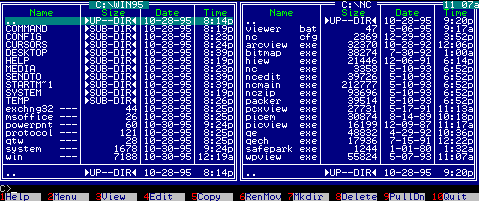“It’s a norton thing.” — It’s a two-faced case.

Many computer users are concerned about the dangers “viruses” and “worms” are causing on the internet. They read in computer magazines and see on the TV news that all the time new threats are appearing and their computer is under constant attack.
Some are driven into the entwined arms of Peter Norton, a software publisher that earned his reputation in the 1980s with Norton Commander, a software that could almost make you think MS-DOS was an operating system.
But this was a long time ago. Today you can ask yourself if it is worse to have your computer slowed down by a virus itself or by Norton AntiVirus, a software so heavy and baroque that it makes the latest Duo Core processors scream. A virus at least needs your computer to send spam messages and therefore keeps a minimum level of operability. Norton AntiVirus just makes sure nothing works anymore, including viruses.
Norton, once the synonym for really enhancing the computing experience, became the icon of the schizophrenic software business logic that once you really solve a problem you destroyed your own job.
Use Norton to express ambivalence, conflict within, split personality and day-to-day self-deception.

This is a screenshot of the ancient Norton Commander. Its killer feature was to split the text-only display of MS-DOS into two pseudo windows. This cleary shows that dispartment has always been a core idea in the Norton product line.
Not sure if I’d use it so much as for ambivalence, as for screwing something up whilst trying to make something better, because you lack a certain knowledge in that area - knowledge that you don’t even *know* you lack. A screwed up, unhappy, ironic situation worthy of Catch-22.
For example, my uncle regularly “Norton”s his computer, both literally and figuratively; literally in that he installed NAV (which I found at one point to be the main thing causing massive performance and reliability issues, along the lines of certain classic viruses such as “SLOW”), and having installed several other similar security and utility programs, none of which worked right, all of which were doing awful things to the system, and none of this he knew, although some of them (again e.g. NAV) were well known amongst more committed users as being “steer clears”.
Someone trying to bake a cake (in the face of massive culinary inexperience) and finding it not rising or setting properly could Norton it by turning up the oven temperature and causing it to burn. You could Norton your car by attempting to change your own flat tyre and not realising the jack is designed to only be placed in a small number of specific points on the body… etc, etc.
In fact, now you’ve brought it to my attention, I believe this is a concept that wasn’t easily expressible in one word before (at least in English - perhaps there’s an existing word in another language that can be taken in place of the trademark?) and I may end up using it a lot, though more than likely not in the way you intended.
In that, I may have slightly Nortoned your article, but then again… not. As I realise what I’m doing before the fact rather than after it :)
[…] his blog “Idiom-Suggestions on how to talk in the 21st century” Dragan Espenschied names the software “Norton Antivirus” among other striking examples to have […]